When you first meet people, do you know how to read their emotions and thoughts? There’s an old saying: “the eyes are the windows to the soul.” Sound familiar? We say, it’s not wrong!
This article is part of our body language guide. Click here for more.
We can learn a lot about people by observing their eye behavior; particularly we can discover their hidden emotions. In this post, I want to break down different eye behaviors and cues. In this guide, you will learn:
- the cue that best indicates if someone is (truly) happy to see you
- who to wink at to get brownie points (and who to avoid winking at)
- how to appear to be the best listener in the world, even if you’re terrible at it
- the relationship between eye direction and lying
- and more!
Test Your Eye-Decoding Skills
If you think you have what it takes to know the hidden meaning behind the eyes, it’s time to put your skills to the test. We love conducting new experiments on human behavior here in our Science of People human behavior research lab, and we want to know how good you are at interpreting emotions just from the eyes alone.
Watch our video below to learn how to read someone’s eyes:
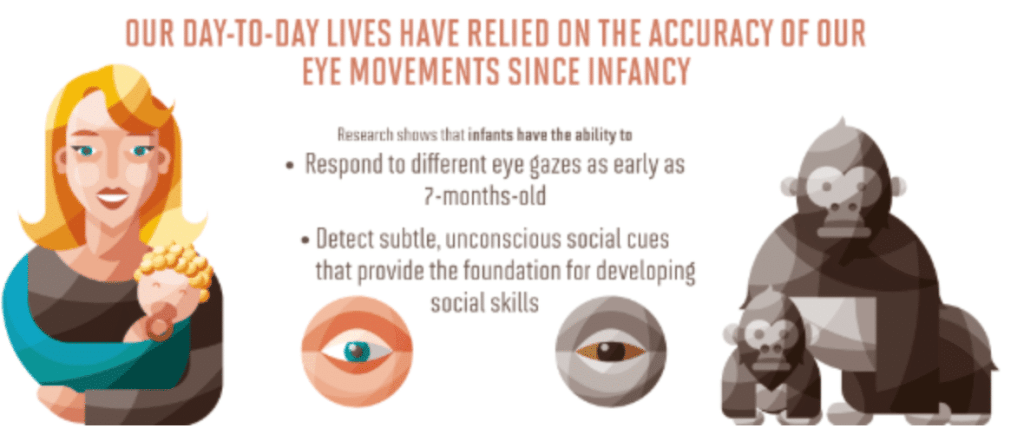
Baselining the Eyes
Before getting into details, I first have to explain the importance of baselining. The first step to figuring out if someone is lying to you is to find their baseline. Here are a few tips to get you started:
- Watch their blink rate. If they start to blink fast or delay their blinking, this could signal interest or concern.
- Baseline their eyebrow movements. Are they eyebrow-expressive? Or do their eyebrows stay motionless like a tree stump?
- Watch their eye direction. A person may have a favorite side—left, right, up, or down—when they are thinking of something. Any dramatic shift may alert you that they might be stressed or anxious.
Once you have established someone’s baseline, you can look for some of the typical gestures people make with their eyes, outlined below. If you see one of these clues, and it is different from their baseline behavior, you know it is a red flag, and you have to dig a little deeper.
Besides baselining behavior, there are many different techniques you can use to read body language. We spent hundreds of hours gathering research and science and packing it into this comprehensive book. Check out more about cues:
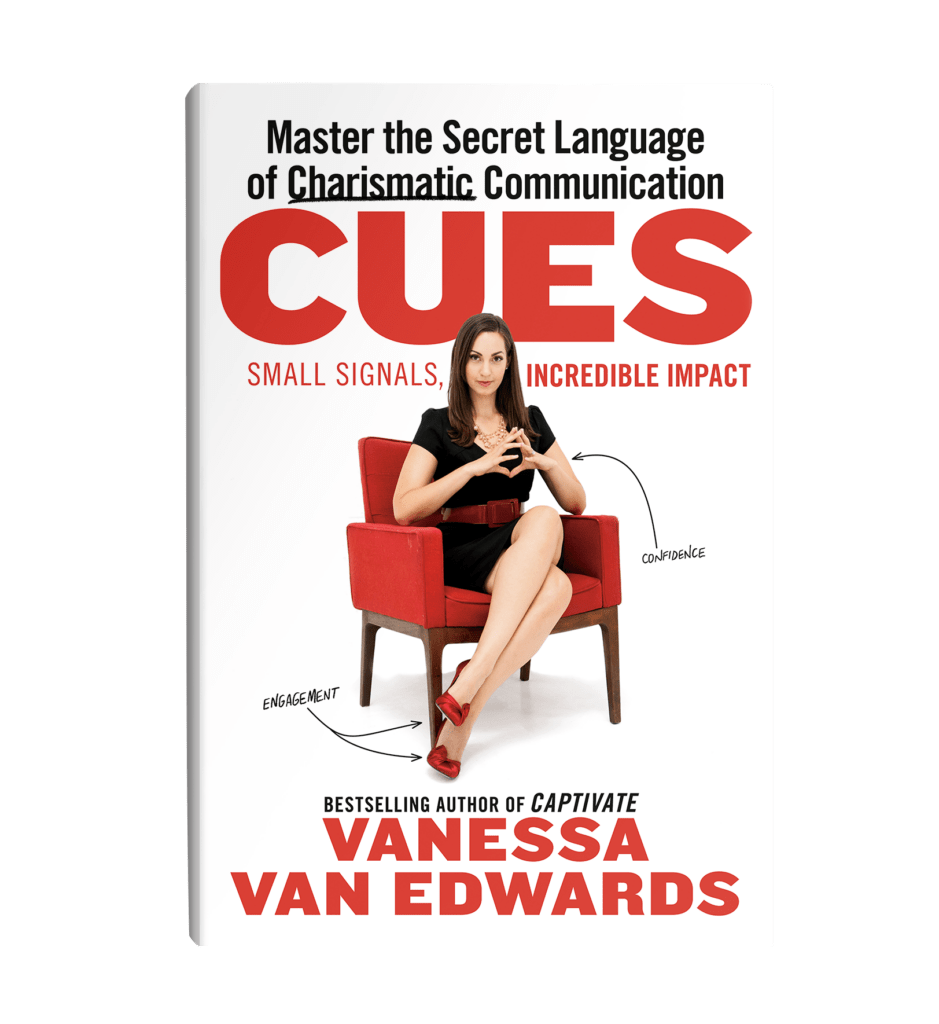
Unlock the Secrets of Charisma
Control and leverage the tiny signals you’re sending – from your stance and facial expressions to your word choice and vocal tone – to improve your personal and professional relationships.
Eye behavior is an important part of courtship and building rapport. Here are the 7 gestures that indicate interest:
The eyebrow flash
What It Means: Flashing shows signs of pleasing. When we flash, we arch our brows less than one-fifth of a second, and–like most gravity-defying behaviors–it is considered positive and may also be used to thank someone or add emphasis when talking. Babies who are just a few months old light up when they see their mothers do this.
The eyebrow flash IS the unofficial cool kid’s greeting, but it’s also used all around the world. See someone you recognize? Eyebrow flash. Want to get someone’s attention from across the room? Employ the flash. Think someone’s lookin’ hot and spicy? Flash, flash, flash!
Eyebrows play a pivotal role in facial recognition. In fact, one study has shown that removing the eyebrows from pictures of celebrities decreased participants’ ability to identify them—more so than removing even the nose or eyes! Eyebrows protect us from dust, light, and moisture1.
Do you know who’s great at flashing? Ramit Sethi. Just check out how powerful a flash those manly eyebrows can give:
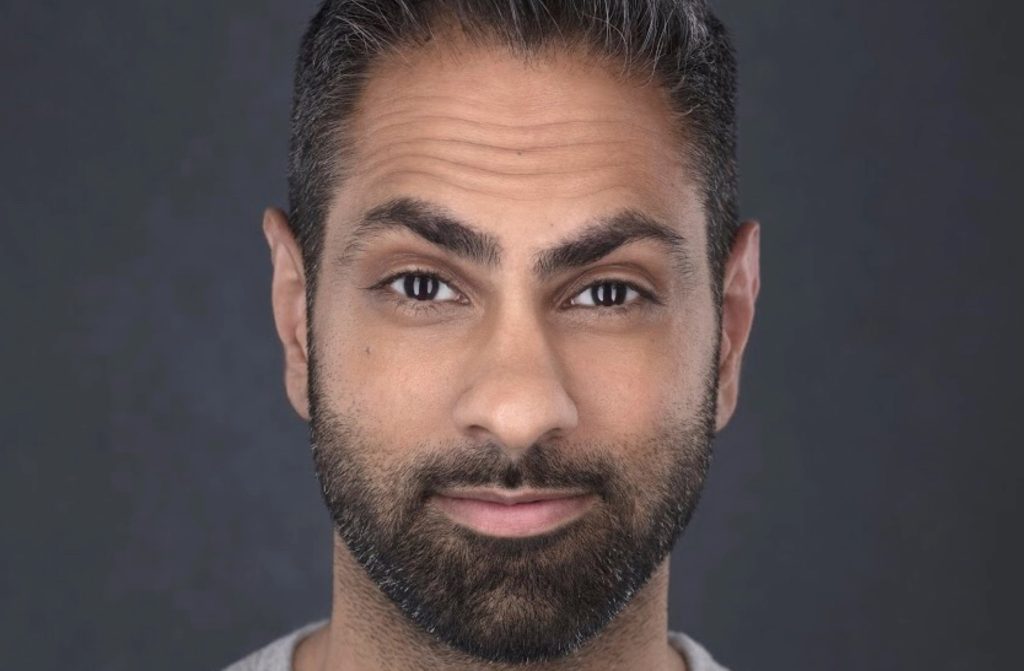
Even monkeys and apes communicate with this inborn gesture2. Only the Japanese do not flash their eyebrows, since it is considered improper or impolite, with some sexual connotations.
The golden rule is always eyebrow flash people you like or those whom you want to like you.
Generally the eyebrow flash is an awesome greeting, but it can also be coupled with a smile and a quick up-down to indicate flirting:
Pro Tip: How to Know if Someone is Happy to See You
Here’s an amazing tip that most people do NOT know about. When you see an old acquaintance, say hello and pay close attention to their brows. If you notice no movement at all or barely any… they may actually be unhappy to see you. But if you see a sharp rise AKA the flash, then that’s a good sign they are happy!
Winking
What It Means: Everyone has been winked at at some point or another. 😉 We generally take it as a sign of flirtation. It also gives us a welcomed split-second break that stops continuous eye contact from turning creepy.
Winking is a way of softening what could be threatening continuous eye contact.
Fun Fact: Are Women Better at Reading Eye Cues Than Men?
Dr. Simon Baron-Cohen at Cambridge University experimented with several participants by showing photos of only a narrow strip of random faces with only their eyes showing. Participants were asked to choose between mental states expressed, such as friendly, relaxed, hostile, worried, and attitudes such as “desire for you” and “desire for someone else.”
The research says that men averaged 19/25 while women scored 22/25. This shows that both sexes have a greater ability to decode eye signals than body signals, and women are better at it.
In this scene in Mean Girls, Regina asks Cady to give her some privacy with her friends for one second. To avoid making it look mean and add understanding or playfulness, she has a toothy grin at Cady and throws in a friendly wink to let her know she’ll get back to her (timestamp 0:52):
How To Use It:
Pro Tip: Wink to Appear Friendly and Flirty… But There’s a Catch
Want to ramp up your warmth in conversations? In a 2009 study, male and female actors in college campuses and shopping malls winked at strangers after asking them for the time. The participants were asked what the wink meant afterward. The most common results found that a wink was most commonly associated with thankfulness, friendliness, and flirtation.
However, in a 1999 study, one person of each sex went to random people and asked for the time. Once they got the time, they winked and left. Researchers found that people being winked at only liked the winkers if they were of the opposite sex.
Single eyebrow raise
What It Means: A single eyebrow raised indicates surprise. But throw in a lovely smile? That may be a sign they are interested! But don’t rush in yet…
Depending on the context, it can also mean someone is skeptical.
Watch for the clusters. Smiling and laughing, coupled with open body language and a head tilt? Green light. Raised brow but crossed arms and legs? Take it slow and steady.
Fun Fact: A 2012 study of participants inspecting nude bodies shows that men spent more time looking at female private areas than men’s private areas, but women spent equal amounts of time looking at females and males. So there you have it: men are dirtier than women!

Raising eyebrows
What It Means: Moving from the single raise to the double, now we mean business. Women pluck their eyebrows higher up their forehead because it makes us look more helpless. This actually releases hormones in a man’s brain to protect and defend the female. Women tend to raise their eyebrows and lower their eyelids to give the look of orgasming (think Marilyn Monroe).
On the other hand, if both eyebrows are suddenly raised, this can mean someone is surprised, such as when receiving good news. However, it can also mean that someone is worried. This is different from an eyebrow flash because the eyebrows usually stay raised longer.
I often get this question: “Why do people raise their eyebrows when they talk?” When we want to make an important point during a speech or argue with someone, we tend to raise our eyebrows. This is a way to show someone that you are actively listening to them.
This gesture is also used as a punctuator during speech. People raise their eyebrows as a natural warmth cue—to say “look at me!” and it is considered a micropositive when it is not part of the surprise expression.
Even monkeys have been shown to recognize whenever someone raises their eyebrows.
Pro Tip: How to Be A Really Good Listener
Typically in conversation, when someone is speaking and really wants you to pay attention, there will be a cluster5:
– They will look at you
– When they gain momentum and make a big statement, they will look away briefly
– They will look back again after they’re done speaking to see if an impact has been made
Now here’s where the eyebrow raise comes in—raise your eyebrows and give a triple nod to look attentive. This reinforces to the speaker that what they said DID make an impact and will make you memorable.
Raised eyebrows are also an indicator of interest. According to the Peases’ book, “Why Men Lie and Women Cry,” women widen their eyes and raise their eyebrows and eyelids to create a “baby face” to trigger in men the desire to protect. It can also mean a woman is delighted and excited to see you.
Rapid eye blinking
What It Means: Dr. David Givens, director of the Center for Nonverbal Studies, says that rapid eyeblink (or “eyelash flutter”) means “you’ve raised the blinker’s level of psychological arousal… faster blinking may reflect sexual excitement.”
Check out this proposal in The Bachelor—you’ll see lots of eye fluttering, indicating excitement (timestamp 3:29):
Flirty eye blinking is known as “eye batting”—this is usually coupled with a downward head tilt and is associated with more “baby-like” features, as the tilt makes our face smaller and eyes bigger.
On the other hand, rapid blinking can indicate an inner struggle3. You might see rapid eyelid fluttering if someone says something you don’t like. We also flutter if we have a hard time expressing ourselves in a conversation, such as in a performance or delivering information.
Prolonged eye contact
What It Means: When people think others look at them a lot, they subconsciously think they are liked. Eye contact is a huge rapport-building gesture and boosts dopamine, and it’s generally a good idea to maintain more eye contact than less. I found people are not making enough eye contact nowadays!
Our gaze should meet 60-70% of the time to build good rapport.
We tend to favor those who make more eye contact with us, especially if they are of higher status1. For example, eye contact from a VIP makes some of us feel favored, and people who make more eye contact are generally seen as more intelligent.
Making eye contact, even if it’s just 30% of the time, has been shown to significantly increase people remembering what you say.
Mutual gazing has also been found to increase feelings of love and affection toward others, and that’s why the scientifically proven 36 deep questions suggest mutual eye gazing as an integral step for relationship building.
Pro Attraction Tip: How to Tell if Eye Contact is Flirtatious
Want to know if he/she wants you and isn’t just staring into the distance? Look for a cluster of gestures, according to neuropsychologist Marsha Lucas. “A good one to watch for: after making eye contact, she looks down a bit, gathers or otherwise preens her hair, and then looks up at you while her chin is tipped.” You might even see an eyebrow flash of recognition after eye contact. These are all good signs!
In 3-person male groups, you may notice the leader controls the flow of conversation with his eye gaze4.
- After he’s done talking, he will show an increased tendency to engage in prolonged gazing at someone.
- This is similar to inviting them to talk or take the floor.
Eye gaze was found to be more quickly shared in participants who were tasked with making a cake together. This means that social context can affect our gazing behavior during interactions.
Watch our video below to learn how to read people and decode 7 body language cues:
How to Be More Persuasive, Outgoing, and Smarter
Speakers who use more eye gaze have it all4:
– They are viewed as more persuasive, informed, truthful, sincere, and credible.
– They are likely to be more extroverted, agreeable, and open.
– They are viewed as more intelligent and score higher on the IQ test.
Increase eye gaze to reap the rewards!
On the other hand, you CAN overdo it…
For example, in some cultures, such as in the Middle East, eye contact between men and women can be punished.
And have you turned on the TV recently? Newscasters may seem super robotic and unnatural because they are reading from a teleprompter and can’t look away, or they will miss reading the words5.
Too much eye contact can also be seen as threatening and can make people feel uncomfortable. It can even signal disagreement if a person keeps silent and their gaze is held a few seconds too long. I call this the “disappointed dad stare.”
Pro Tip: Avoid The Stare Trap!
Want to know a big mistake many guys make in dating situations? They. Stare. Way. Too. Long!
They may speak and keep eye contact and forget to look away. This makes his date uncomfortable because she is forced to either stare back or look away while he is talking to her. So while long eye contact can be good, make sure to look away occasionally to avoid the creeper look.
How to Spot a Liar: Look for the Long Stare
In one study, participants were told to tell a series of lies to others in recorded interviews2. The recordings were used in communication seminars, and viewers were asked to judge who was lying and who wasn’t:
– 30% of liars constantly looked away when they lied. The viewers accurately spotted these lies 80% of the time, with women slightly better at spotting the lies.
– The other 70% maintained strong eye contact while telling lies. The surprising part? Lie catching dropped an average of 25%, with men scored 15% and women 35%.
Liars are much more likely to keep eye contact even after saying a lie. They do this Liars are much more likely to keep eye contact even after saying a lie. They do this to check your face for believability cues, to see if you bought the lie or not. Look for the long stare the next time you want to spot a lie!In one study, participants were told to tell a series of lies to others in recorded interviews2. The recordings were used in communication seminars, and viewers were asked to judge who was lying and who wasn’t:In one study, participants were told to tell a series of lies to others in recorded interviews2. The recordings were used in communication seminars, and viewers were asked to judge who was lying and who wasn’t:
– 30% of liars constantly looked away when they lied. The viewers accurately spotted these lies 80% of the time, with women slightly better at spotting the lies.
– The other 70% maintained strong eye contact while telling lies. The surprising part? Lie catching dropped an average of 25%, with men scoring 15% and women 35%.
Liars are much more likely to keep eye contact even after saying a lie. They do this to check your face for believability cues, to see if you bought the lie or not. Look for the long stare the next time you want to spot a lie!
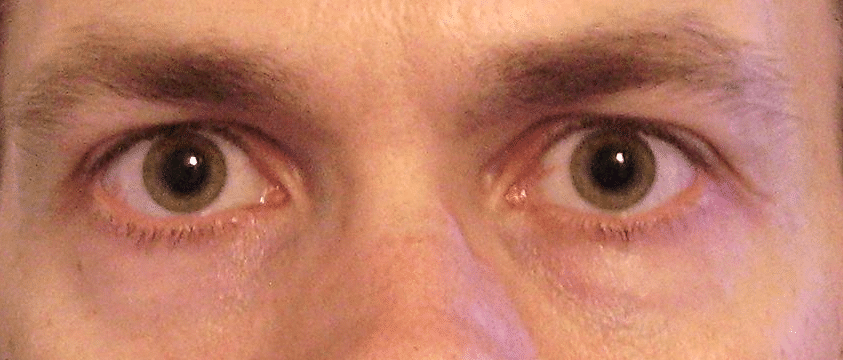
Pupil dilation
The Winning Poker Player
Champion poker player Phil Hellmuth had a choice: fold and give up, or raise his bid. He folded… and successfully avoided a major loss (his opponent had a full house)! So how did he know to fold? How could he tell? Because Phil watched his opponent’s eyes dilate when he received a certain card during the tournament.
We dilate when we’re attracted. A 2019 study confirms what psychologist Eckhard Hess researched in the ’60s and ’70s—our pupils contract when we see something arousing or do something mentally challenging.
This is a very arousing cue—Hess found that heterosexual men and women dilate when viewing pinups of the opposite sex and constrict when they are viewing same-sex pinups.
Similar results were found when people were asked to look at pleasant or unpleasant foods, political figures, a disabled child, war scenes, or to listen to music.
The bigger the pupil size, the greater the interest.
You may notice someone’s pupils growing when you stare at them. This is a good sign! Pupil size increases are associated with problem-solving, and they reach a maximum dilation when a person arrives at the solution3.
Take a look at the following photo: which picture is more attractive?
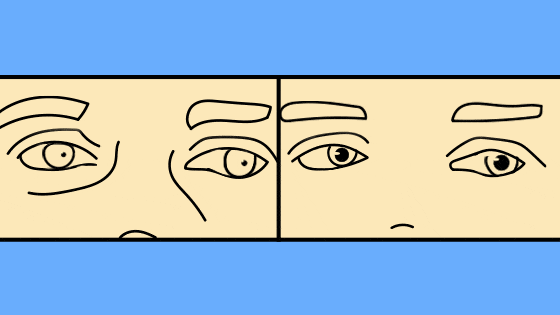
People rate photos of models as more attractive if the photo has been altered to make their pupils larger2. Romantic encounters are most successful in dimly lit places because everyone’s pupils dilate and create the impression of mutual attraction.
In one study, participants were told to choose a partner who was trustworthy, pleasant, and easy to talk to on an intimate basis4. They were taken to a room with 2 individuals (rated generally the same attractiveness).
The study found that gazing was an overwhelming factor, but it also included pupil dilation, although nobody mentioned it. But now that you know, you can also look for pupil dilation! Woo!
Fun Fact: If you’re signaling to a man, be patient. A study on eye gaze and found that most men usually required 3 separate gaze signals to “get” that they are being flirted with and sometimes even up to 5 for really slow men!
We dilate when we like objects. Researchers found that pupils dilate more when people see items they’ve seen before, i.e., old vs new items4. Watch for this cue when children pick their favorite toys—Sienna’s eyes dilate when she goes for her Frozen dolls!
Another experiment showed photos of food, with subjects being asked their food preferences4. The more individuals said they preferred this or that food, the more their pupils expanded. But some individuals showed a poor match. These were people whose eyes dilated, but they said they disliked a food.
Why? They were on a diet but still secretly liked the food! Pupil dilation is something that cannot be controlled.
We dilate when looking at photos of people. Watch for this cue if your manager is shifting through potential applicant resumes. People’s eyes dilate more when viewing photos of liked candidates and constrict for photos of disliked candidates4.
We dilate when we’re angry. On the other hand, pupil dilation is not just for positive arousal; angry faces and body cues have been shown to elicit high levels of pupil dilation.
There are cultural differences. White and Asian participants studied faces from their own race and of each other: Researchers learned that participants had more dilated pupils when looking at other races4.
Another experiment was carried out with liberal-minded people who were shown photos of black males kissing white females. All subjects said they approved. However, liberals “at heart” had pupils that matched beliefs, but persuaded or pseudo liberals showed pinprick pupils of disapproval.
And other causes. Pupil dilation and constriction can be caused by unrelated events—lighting variation, medical conditions, and even certain drugs can change pupil size.
Pupil Dilation Throughout the Ages
Pupils size is a longstanding cue that’s had attention in the past. Here are a few ways we’ve used our pupils to throughout history:
– Pupil decoding was used by the ancient Chinese gem traders. They would observe the dilation of their buyers when negotiating prices to gauge whether to raise or lower the price2. Jade dealers of pre-Revolutionary China learned to counter and wore dark glasses to hide their dilated pupils when handed a valuable specimen of jade5.
– During the Italian Renaissance, women drank belladonna berries (which are toxic, by the way) to dilate their pupils and make them look more attractive.
– Nowadays, some tests show that expert card players win fewer games when opponents wear dark glasses. Rapid pupil dilation would indicate to the other player he should not bet on the next hand.
A number of studies talk about the direction of eyes during lies. Typically, when people look up and to the right, they are lying or tapping into their imagination. When they look up and to the left, they are remembering or recalling something, tapping into the memory part of the brain. However, be sure you get to know their natural movements, because this can be reversed for left-handed people. Here are some quick guidelines observed in people:
– Looking to Their Right = Auditory Thought (remembering a song)
– Looking to Their Left = Visual Thought (remembering the color of a dress)
– Looking Down to Their Right = Someone creating a feeling or sensory memory (thinking what it would be like to swim in jello).
– Looking Down to Their Left = Someone talking to themself.
This can help you detect a lie. If you ask someone a question and they look down to the right, they are creating a memory instead of remembering something. Note of caution: I have not been able to find a study replicating this effect—so only use with caution!
Now, on to the cues in depth!
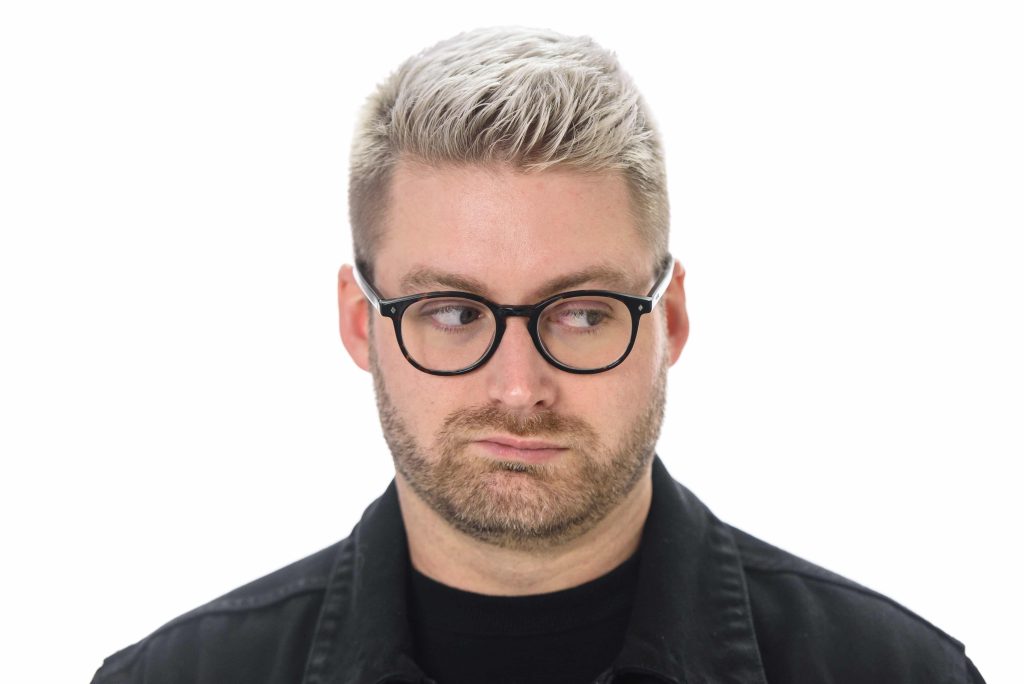
Looking left or right
What It Means: Looking sideways can demonstrate doubt, reluctance to commit, suspicion, or contempt. This usually indicates the need for more info. If someone is glancing sideways and also has a furrowed brow, it can denote suspicion or critical feelings.
A sideways glance with eyebrows up usually indicates interest or is a sign of courtship.
In other cases, it indicates that a person is thinking.
Pop Quiz: Left or Right?
Science shows there is a particular direction our eyes tend to shift when thinking about visual images versus symbols and numbers. Do you know which way our eyes go when thinking of visuals? Is it:
a) Left
b) Right
c) Bottom-left
d) Bottom-right
Read on for the answer…
A classical study in 1972 of mathematicians showed that those who looked left while thinking used more imagery. People who look left while thinking may have more of an artistic and creative way of thinking. But those who looked right while thinking used more symbols.
Contrary to popular belief, studies show that looking left or right is NOT an indicator of lying. Spotting a liar is more intricate and tends to involve many other cues.
Our eyes are accessing cues when we look laterally, downward, or up and to the side3. These eye-direction cues indicate we are in a state of processing thought or emotion, like when a question is posed to us.
Pro Tip: Catch Nonmatching Gestures to Reveal a Lie
Remember that time Bill Clinton said, “I did not have sexual relations with that woman”? (timestamp 1:09):
Pay close attention as he gestures with his hand to the right, but actually looks to the left. This disconnect in gesturing is a sign that he is lying. Furthermore, right after that, he says, “I never told anybody to lie,” with a head shake (this is likely true). However, when he says he didn’t have sexual relations with Monica Lewinski… he DOESN’T shake his head no. This indicates he’s lying.
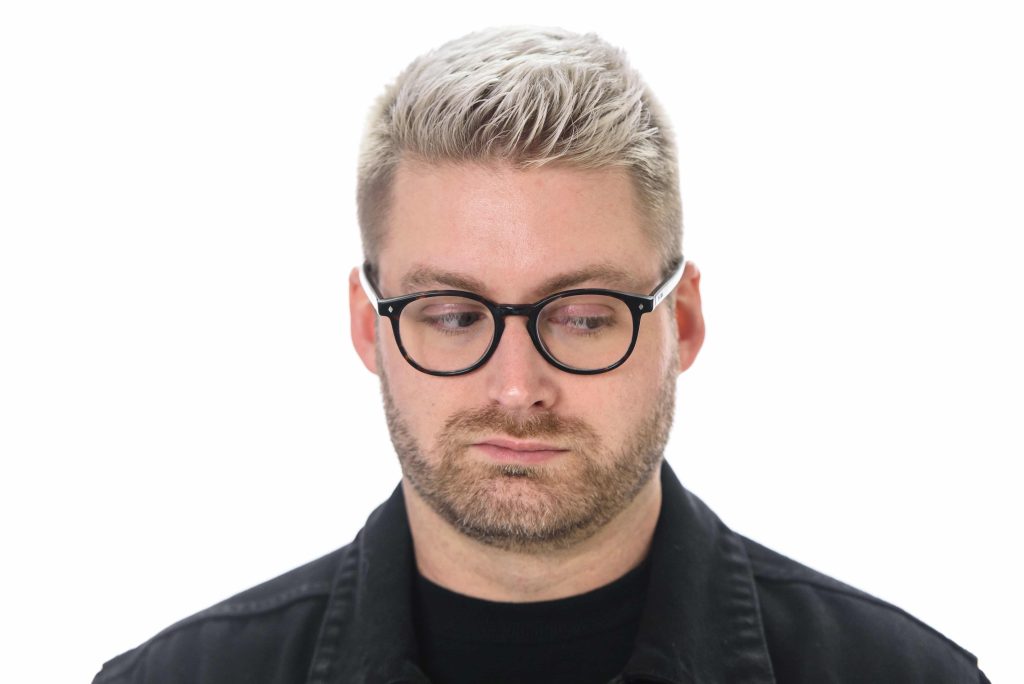
Looking down
What It Means: Do you remember as a child walking down the cereal aisle? Right there at the corner waiting was Tony the Tiger. He looked down, since we were short, and made powerful eye contact. We instantly felt a sense of bonding. This body language is so powerful!
In other cases, if someone immediately looks down during conversation, it could mean they feel insecure, unconfident, or are just thinking. We could also be conducting inner dialogues and demonstrating submissiveness3. In many Eastern cultures like Japan or China, it is taught that making direct eye contact—especially with higher-ups—is rude, so looking down is quite normal.
And watch for the head tilt back! If someone lifts their head and looks down their nose at you, it usually means they feel superior.
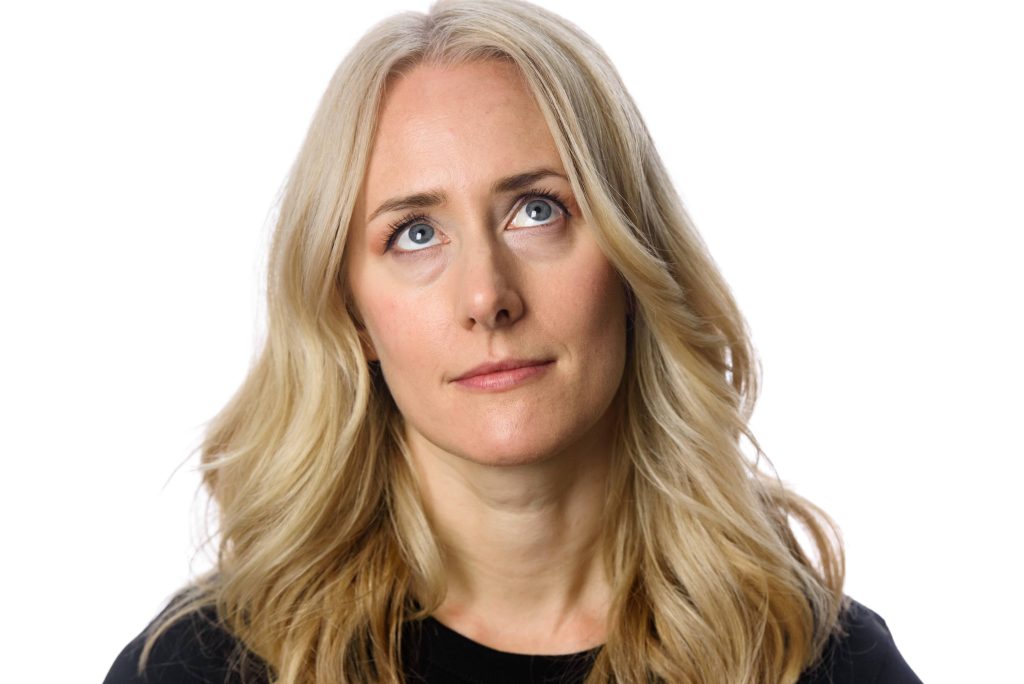
Looking Up
What It Means: Looking up can mean that someone is thinking about what to say next.
For example, you can see Daniel Radcliffe in the following video looking up after being asked a question (timestamp 1:20):
Looking up after being asked a question may indicate that someone is searching for the right words to say.
Someone might also look up at the ceiling or the sky when things seem impossible or when a person has a run of bad luck1. For example, imagine a golfer making a putt. He concentrates and puts everything he has into that swing but misses. Bummer! You might see him look up as if to say, “Why God, why!?” to relieve his stress and tension.
Sideways glance
What It Means: Combined with slightly raised eyebrows or a smile, sideways glances communicate interest and are more common among women than men. However, look for this cluster:
- tilted head motion
- sideways glance or a brief roll of the eyes
These 2 cues together may mean “I am listening to you, but I am not buying what you are saying—at least not yet”3.
On the other hand, these glances could signal that we are suspicious, uncertain, hostile, or critical. We show this by lowered eyebrows or the corners of our mouth, followed by a furrowed brow.
We may even “eye point” as a secretive signal. If a person does this to you, they are warning you that someone has entered the room out of your line of vision5. Eye points can even be a fraction of a second in which we quickly glance in someone’s direction with an intense stare, then return the gaze to the listener to see if they understood our message.
We might have to repeat it several times to get the message across. This requires some delicacy to remain secretive.
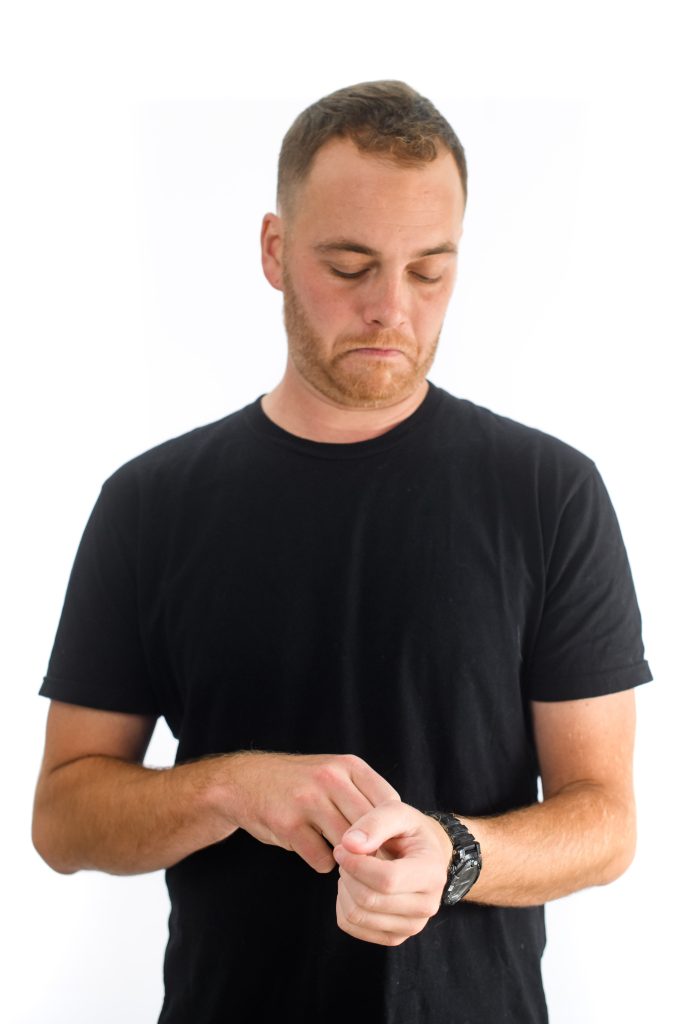
Looking at watch
What It Means: Usually, where the eyes go, desire often follows. If someone looks at their watch mid-conversation, this is an indicator of mentally disconnecting. They have a meeting or appointment to attend… or they might just be wondering if they’re spending too much time talking to you. Ouch. Maybe it’s best to cut the conversation short or end the conversation.
But hey, don’t feel guilty if this happens to you. Even former president George H.W. Bush is guilty of this. Watch as he checks his watch at the beginning of the video as an audience member asks him a question. He also looks at his watch a few more times during the debate. Not surprisingly, he stumbles on this question and has to ask for clarification. You can view a video of the scene here.
What do you think was so important he had to check the time?
Covering or shielding the eyes often is seen when people literally do not like what they see. You will see this when people feel threatened by something or are repulsed by what they are hearing or seeing. This is an indicator of an uncomfortable reaction. You also see eye blocking in the form of eye rubbing or lots of blinking. Eye blocking is a powerful display of consternation, disbelief, or disagreement. Here are 7 eye-blocking behaviors in depth.
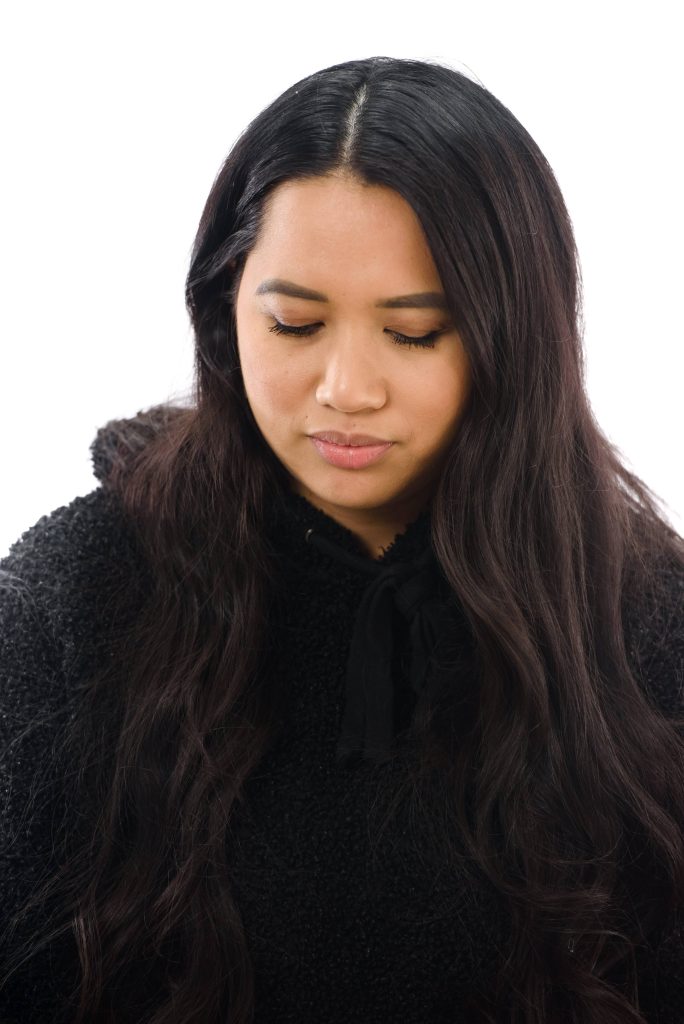
Closed eyelids
What It Means: Generally, closed eyelids are a sign of disbelief or stress.
One of the 5 most common signs in babies that indicates pain is when eyes are squeezed tightly shut4. They’ll even eye block in the womb when confronted with loud sounds. It’s such an automatic response that children born blind will even cover their eyes when they hear bad news.
The Eye-Blocking Arsonist?
Police carried out an arson investigation of a hotel in Puerto Rico that claimed 97 lives3. They asked the security guard on duty where he was before, after, and during the fire, or if he was the one who set the fire.
They noticed his eyes closed shut only when asked where he was when the fire started. After some intense questioning, they found out the truth: the guard left his post to see his girlfriend, and during that time, 3 arsonists entered and set fire to the hotel.
In extreme cases, you may see the stammering eye, with eyes closing every so often for several seconds.
“It’s like your screensaver with password protection. Its goal is to stop people from seeing your sensitive information.”
—Janine Driver, TEDx talk
Here’s an example of Lance Armstrong right as the interviewer says “performance-enhancing drugs.” Notice his eye block and the fluttering of his eyelids (timestamp 0:58):
In intimate settings, however, closed eyes can be a good thing. It says “I trust you… I am in the moment with my other senses3.
Navarro also says closed eyes can be used for more emphasis, to affirm what is being said.
Pro Tip: How to Concentrate Like a Monk
Om mani padme—oops! I was meditating for a second. Did you know meditation with closed eyes is amazing for concentration? In one study, participants did better when closing their eyes versus looking at the experimenter when they were asked a difficult factual question. Essentially, closing your eyes is a way to filter out external stimuli4. The next time you’re solving a hard problem, close your eyes to activate those brain muscles!
Eyelid Touching
What It Means: Eyelid touching is essentially the same as eye blocking, but coupled with tension relief3. Students may touch their eyes during an exam when they’ve stumbled upon a hard question. You may even notice eye rubbing (more on that next).
Rubbing eyes
What It Means: Rubbing the eyelids acts as a self-soothing gesture or “visual reset” by stimulating the vagus nerve, slowing down heart and breathing rates during times of stress or fatigue.
You can also see people rub their eyes during conversations and interrogations when they are asked a difficult or stress-inducing question or if they want to cut off eye contact to reduce their own stress or anxiety.
Fun Fact: Blue vs. Brown Eyes
Chances are, your eyes are either blue or brown. Blue eyes are a genetically based marker for inhibition and shyness. And if you have brown eyes? Greater dominance is perceived in brown-eyed men than blue4.
You may often see this eye-rubbing gesture more in men than women, as women might be conditioned to avoid rubbing their eyes, especially if they wear eye makeup.
How To Use It: Use this cue when you want to ignore someone or shut them down. They’ll likely pick up on the message that you’re tired and don’t want to see them.
Slow eyelid closing
What It Means: When someone slowly closes their eyelids, it’s generally an indicator of disappointment or being upset at something that happened. It might also be accompanied by a sigh. Closed eyelids are a staple of mothers with babies who cry a lot (I’m talking from experience).
Increased blinking
What It Means: Someone may blink their eyes more in an attempt to “block you” from their sight2.
Blinking is like closing the curtain on whatever’s in front.
This may happen if someone is bored, disinterested, or feels superior to you. You may even see an extreme version of blink blocking if someone shuts their eyes for 2–3 seconds or longer. This is a nonverbal way of saying, “I wish you were gone!”
A rapid eye blink or a short burst of eye blinks (2–3 in less than a second) can also signal profound disbelief, while faster blinks can mean higher disbelief or nervousness, as well.
Eyelid twitching
What It Means: Dr. Sandy T. Feldman says, “An eyelid twitch results from a spasm of the eyelids and may be indicative of stress or a medical condition.”
Quivering under the eyes is also a display of concern or anxiety, and it can lead to an eye twitch. Months ago, a good friend of mine met me for lunch at a nearby Italian restaurant. I noticed a twitch under her eye. She mentioned she’d had it for a week now because her workload had recently increased, and she’d been working from morning to late evenings.
Miraculously, after her work returned to normal, her eye twitching magically disappeared, almost as if it hadn’t happened!
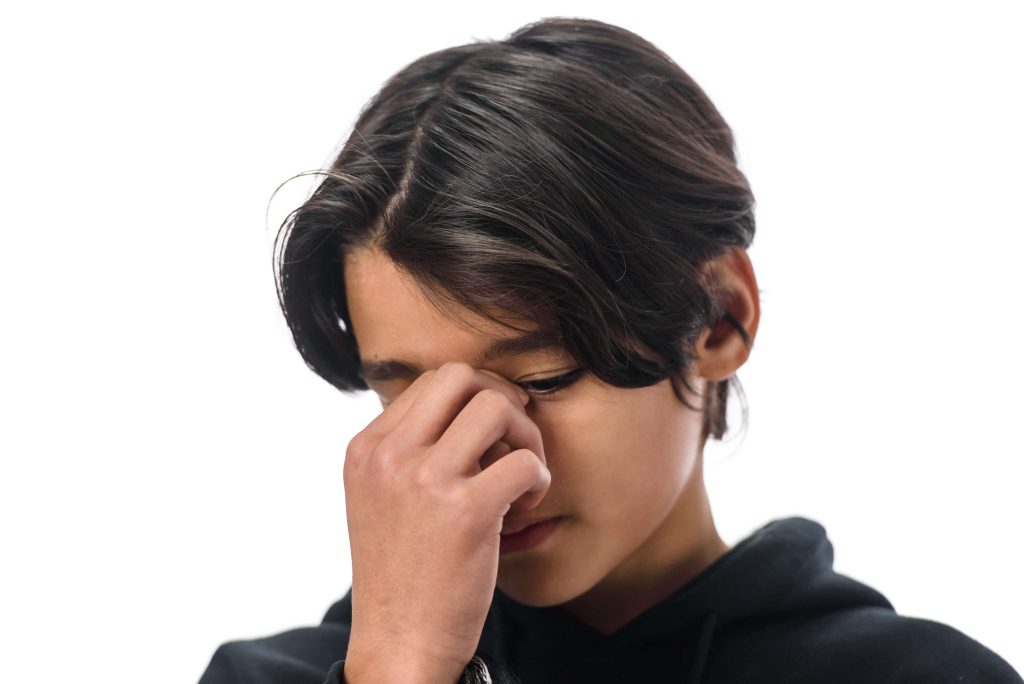
Rubbing or touching between the eyes
What It Means: Did you know the fleshy part between your eyebrows is called the glabella? When someone touches or rubs this part of their eyebrows, it’s usually a sign of high stress.
The key to identifying angry and sad eyes is to look for the muscles. Muscles around the eyes are typically relaxed when someone is feeling neutral. But if there’s tension, you may notice the eyes getting smaller or other tension that indicates a shift in mental state. Even babies’ facial muscles suddenly scrunch before they begin to cry. Watch for these 5 gestures:
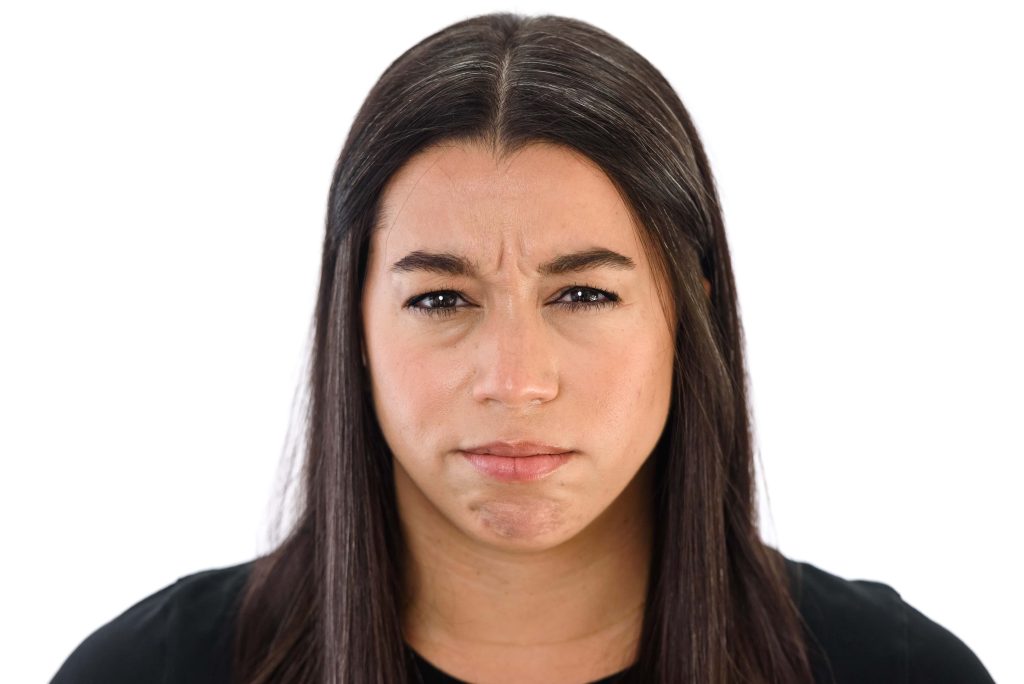
Lowered eyebrows
What It Means: Lowered eyebrows is usually a very dominant gesture. According to a study, in most Western cultures, lowered eyebrows are seen as dominant. But in some areas in rural Thailand, raised eyebrows are perceived as dominant.
Bear in mind that if you see a brief and reflexive eyebrow lowering, it can indicate that someone doesn’t believe what you said. And if the eyebrows drop really low, that can be a sign of weakness or insecurity, such as in a defeated child3.
In some studies, prisoners have even reported that when new inmates arrive, they look for troubled, lowered-eyebrow behavior in newcomers to reveal which ones are weak and insecure. This makes it easy to prey upon them3.
In business, you can look for this movement to probe for weakness or strength in others.
In another study, Strack and Neumann asked participants to furrow their brows while viewing pictures of celebs and non-celebs on a computer. The furrowed-brow group rated individuals as less famous than the control group did, presumably because their furrowed brows caused them to feel skeptical4.
In other cases, lowered brows may signal surprise, shock, disbelief, anger, or even sympathy.
Here’s an example of how to use eyebrows to spot lying: Marion Jones was the first woman who won five track-and-field medals at a single Olympics in 2000. Listen to her speaking at a press conference in 2004, after multiple allegations that she was using illegal drugs (timestamp 2:12), and notice how her eyebrows go up, almost as if in fear:
However, you would expect someone being accused to be angry, coupled with an expression of lowered eyebrows. Throughout the speech, she does not have an angry expression. This incongruence is a tell that she may be lying. Fast forward 3 years later, in 2007, she finally admits to doping (timestamp 0:48).
She is much more sincere in this interview, crying and showing shame cues.
Crying
Fun fact: Did you know that crocodiles actually cry while eating? The reasons remain a mystery.
How to Tell Someone is Fake Crying
In 1994, a woman named Susan Smith fabricated a story that her children were kidnapped. However, she lied about it and actually murdered her own children. One dead giveaway is that she is fake crying. Tears are absent, there’s no nose touching, no swallowing… nothing that would indicate real crying. Watch the video below to see real crocodile tears (timestamp 2:17):

Angry stare
What It Means: Someone might express feelings of anger by lowering their eyebrows. Their heads could also be tilted downward This type of stare is characterized as a long, hard stare that has little to no blinking.
Even cats stare angrily at each other before getting in a fight! Sometimes this works, and the other cat backs down. But other times…
Slow eye movements
What It Means: Slower-than-normal eye movements indicate fatigue. A study of medical residents who worked 24-hour shifts found that the more fatigued they became, the slower their eyes moved.
Anecdotally, I also have some friends who talk like their play speed is 0.5x. And they also move that way, too, with slow eye movements! Take note of your friends’ eye speed the next time you hang around or play board games.
Rolling eyes
What It Means: Eye rolling is the classical move we might see when someone is in disagreement with or conflicted about what was just said. It’s a nonverbal “Oh, whatever!” I used to be a big fan of this cue when I was a rebel teenager—every time my mom told me to clean my room, I’d roll my eyes and say, “I’ll do it tomorrow!” I said that pretty much every day.
You can tell someone is fearful by their widened eyes, constricted pupils, decreased blinking rate, and arched eyebrows. Watch for these 4 cues:
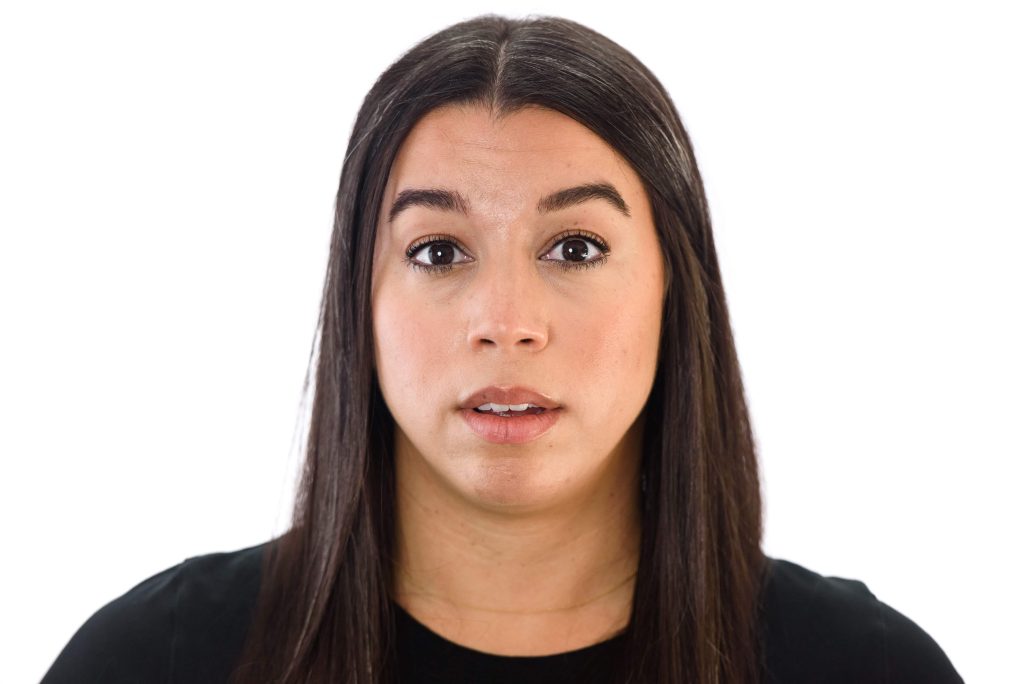
Widening Eyes
What It Means: Widening one’s eyes could indicate fear or surprise. Sometimes it is called “flashbulb eyes,” indicating eyes that suddenly widen, like turning on a lightbulb.
So why do we do it when we’re scared? A 2013 study found that widening eyes increases our visual periphery effectiveness by 9.4%. In other words, people who widen their eyes are better able to spot signs of danger or incoming threats more easily.
Oh boy, do I love a good murder mystery. Here’s a great example of fear in the eyes. Jennifer Pan, who was later convicted of the murder of her parents, is talking to the lead investigator in this next clip. Watch closely as she flubs her statement and looks at the investigator for approval. If you see someone looking for your approval, along with widening their eyes, this is a good sign they may be lying (timestamp 11:45):
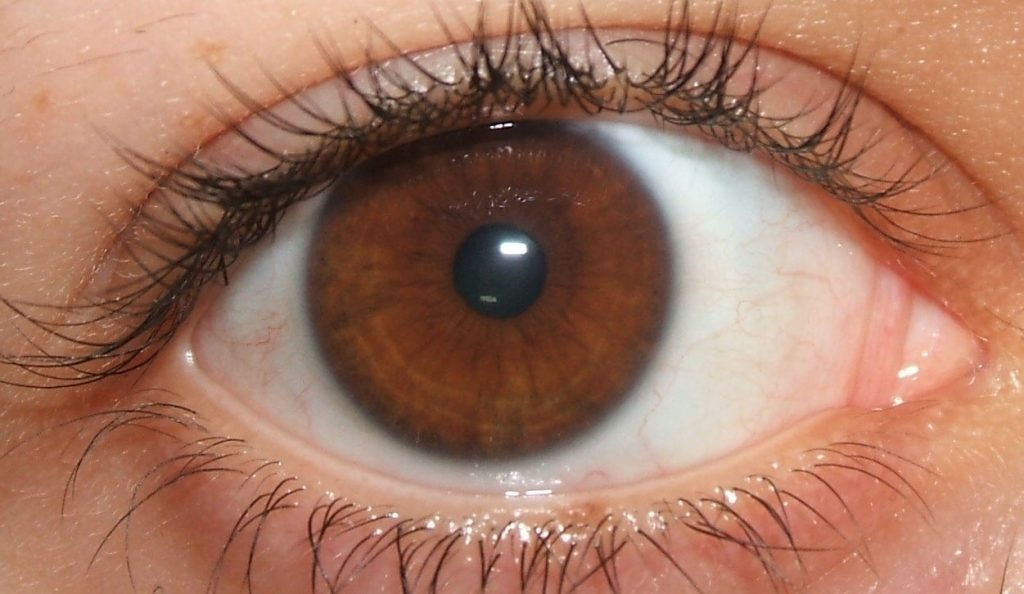
Pupil constriction
What It Means: When we constrict our pupils, everything in front of us becomes precisely focused. Think of a camera lens that narrows its aperture so it can capture a more focused image:
When we have time to process the information and if it is perceived negatively, in a fraction of a second, the pupils will constrict4.Watch for the pupil constriction if a person is scared, as well. Their pupils will become smaller so they can see clearly to fight or flee4.
How an FBI Agent Used Pupils to Solve a Crime
In 1989, while working with the FBI on a matter involving national security, agents Joe Navarro and Marc Reeser interviewed a spy who was reluctant to name co-conspirators involved in espionage.
They presented this spy with 32 3x5in cards, each with the name of someone with whom the felon worked with. They asked the man to tell what he knew about them. When the man saw 2 names in particular, something magical happened. His eyes first widened in recognition, followed by his pupils quickly constricting, and lastly a slight squint.
This cluster was enough to invoke suspicion in Navarro and Reeser. They interviewed these 2 individuals later on, who then confessed their involvement in the crime.
Decreased blinking
What It Means: People blink their eyes at a typical rate of 16–20 per minute, depending on lighting and humidity3. This may change if people look at the computer for long periods of time (less blinking) or if there is pollen present (more blinking).
Watch for the sudden decrease in blink rate. This may happen when a person becomes more attentive to their environment or if they are on high alert. You may notice less blinking if you say something that may be upsetting or controversial.
Liars also blink less: a 2008 study of 13 liars and 13 truth-tellers found that liars blinked less when lying, compared to those who told the truth. Ten of the 13 participants blinked less, and then after telling the truth, their blink rate returned to normal. Only 2 of the 13 people who told the truth showed this same pattern.
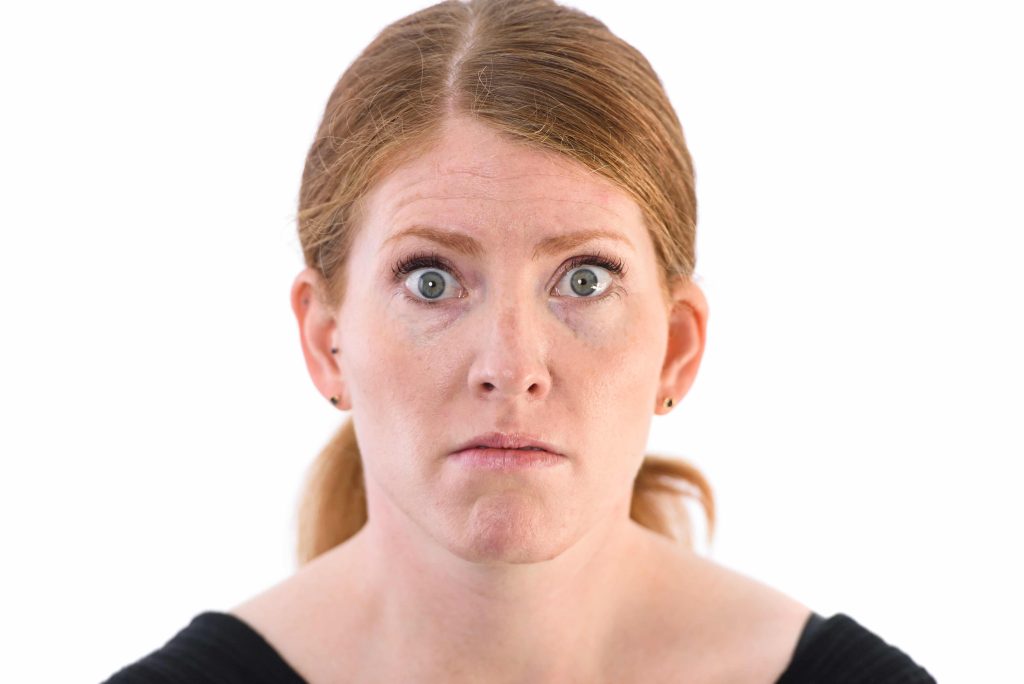
Eyebrow arching
What It Means: If you arch your eyebrows with a tense face and a compressed lip, you may be showing unwanted surprise3. This arch typically lasts longer than an eyebrow flash.
In this section, you’ll find more eye body language cues of emotions. Don’t miss out on these cues—you may commonly see them anywhere, from your employees to even your spouse. Starting with…
Glazed eyes
What It Means: Glazed eyes are the “far-off look”—the kind of look you get when you stare at the wall too long. It looks like you’re looking at something super far away… but you might just be looking at a stranger in front of you (we’ve all been there!).
Glazing your eyes indicates a sign of disinterest and boredom in a conversation. Dating and glazed look? Perhaps the date isn’t going so well.
Sometimes we may even have fatigued eyes when we have long hours working, stress, or crying. It’s easily recognizable, especially if we have strained, puffy, weathered, or discolored eyes3.
And if you’ve ever caught someone randomly staring at you… it might just be because they’re in deep thought or contemplation. Glazed eyes actually allow some people to think or contemplate more effectively. So although it might be creepy at first, it might actually be very innocent.
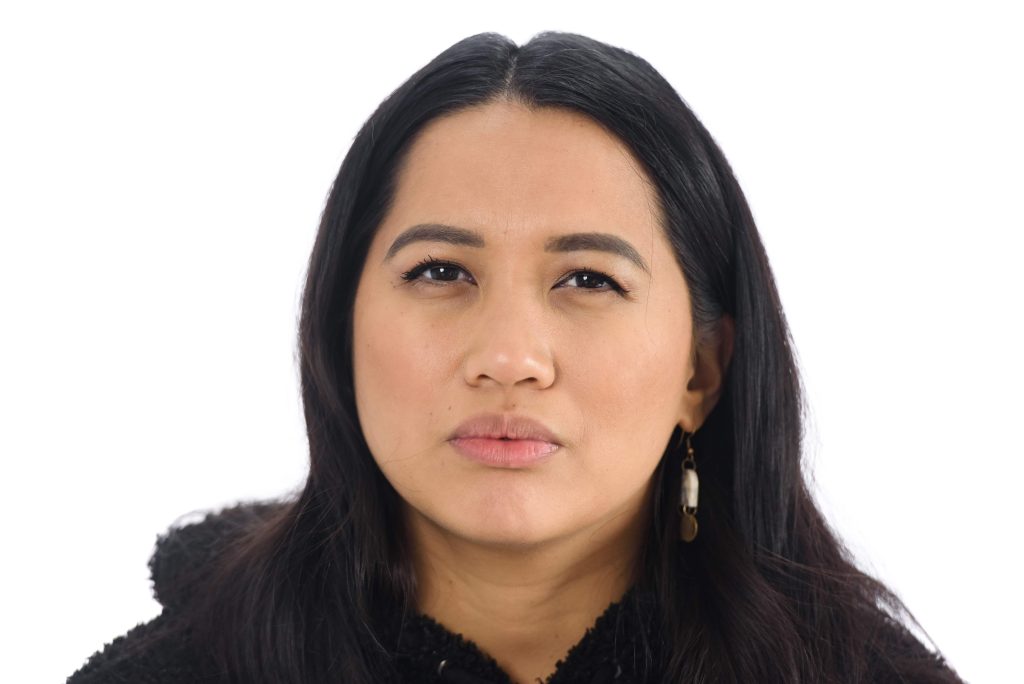
Squinting Eyes
What It Means: The ocular orbital muscles are right around your eyes. When people are suspicious, don’t believe in something said, or think something is untrue, their eyes may squint, with the ocular orbital muscles tightening.
Or, it can be that someone is simply processing information or trying to make sense of something3. Squinting can be super brief and last for about ⅛ second. So if you meet someone, and they immediately squint their eyes, they might harbor negative feelings toward you. Or if someone reads a business contract and squints, it could mean that they dislike or struggle somehow with the wording of the contract.
Squinting is also the best cue to look for to prevent a fight because squinting slightly with lowered eyelids is a sign of subdued anger (i.e., anger before the eruption!). When suspicion or dislike is addressed early, you can calm the other person down.
De-escalation: If you say something and see the other person narrow their eyes at you, go right into clarification and explanation mode. Figure out exactly what they are hung up on and how to address it.
Averting gaze
This is similar to closing your eyes.
Pro Tip: Watch For the Eye Break!
Do you notice someone breaking eye contact more and more? Breaking eye contact more often and longer can mean that someone desires to leave the conversation4.
Looking away is perceived as shyness when it is with locked eyes. This is called the lover’s gaze.
Be aware of some gestures that signal a weakness. For example, these clusters can be deadly in a street encounter:
- averting the gaze
- hunching of the shoulders
- pulling arms close to the body
- pressing knees together
- dropping chin to the throat
It’s generally not a good idea to look down when giving a speech, either. Witnesses who testified while looking slightly downward rather than directly at the questioner were judged less credible, and the defendant whom they were trying to protect was more likely to be judged guilty4.
Science also shows that dominant people have more freedom in eye gaze and can look wherever they want. Subordinates, on the other hand, are more restricted where they can look and when. We’ve taken this cue from history—a king can look wherever he wants, but his subjects have to face him, even as they leave the room.
That’s why if you walk into a business meeting, it’s often that bosses and managers will be looking freely around the room, while entry-level employees have more rigid eye movements.
Pro Tip: Watch Your Eyes During an Interview!
Did you know there is a proper eye etiquette during job interviews? Many employers dislike when applicants move their eyes all over the room “as though they own the place”3. Doing so always leaves a bad impression because it gives the feeling of superiority and disinterest.
Fun Fact: In one study of a nudist colony, the film shows where non-nudist men and women were looking2. Non-nudist men had trouble resisting the urge to look down, and it was obvious. However, women did not experience problems, and they were rarely filmed intentionally gazing down at private parts.
Shifting eyes
What It Means: If you see darting eyes, this indicates the processing of negative information, doubt, anxiety, or fear1. We may dart our eyes around to analyze a situation or consider options. Think of it as “visualizing” our options in front of us.
We may even do this if we’re trapped, say on a bad date that never ends. Our brain will begin to search for escape routes the same way that monkeys and apes do2.
But did you know our eyes shift naturally? Eye contact is actually a series of eye movements called saccades. Saccades are tiny micromovements of the eyes that happen hundreds of thousands of times throughout the day.
In fact, our eyes normally make around 3 saccades per second! And researchers also found that people who have faster saccades tend to be more impatient. But if we were to stare at a person’s eyes without moving our own? We would look like we were “vacantly staring” into the distance2. Not so great if we want to look charismatic.
Bonus: Did you know that shifting your eyes has been scientifically found to deactivate the amygdala? In other words, looking left and right can literally suppress your fear. Watch this cool video and find out how:
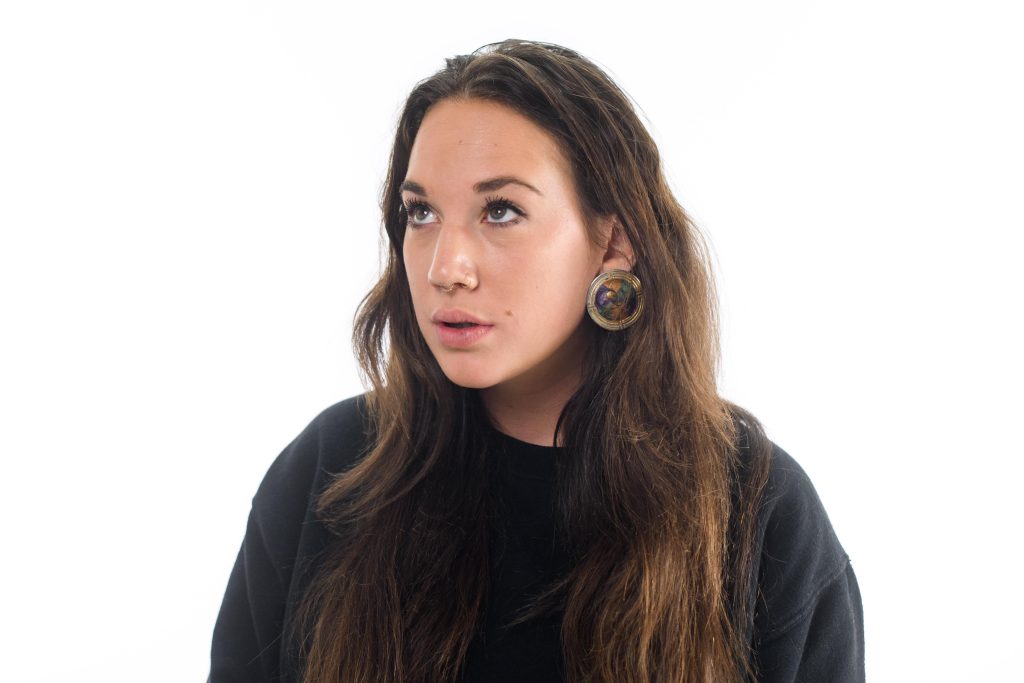
Lack of eye contact
Lack of eye contact indicates nervousness. Lack of eye contact can be seen as nervous or unconfident. For example, in this Bachelor scene, Matt has a hard time looking at Abby because he is nervous and likes her (timestamp 3:46):
Avoiding eye contact can also be a sign of disinterest, and those who make less eye contact are seen as less trustworthy.
A lack of eye contact indicates high status. Compared to people of lower status, high-status individuals tend to gaze more while speaking and less while listening4. You might be able to observe this in your workplace—watch and see if the managers tend to look away while being spoken to.
The least powerful people tend to avoid eye contact with the “alphas” in the room. However, if an alpha averts their gaze, it can lead to feelings of ostracization4.
You can see the same behavior in children: children often look for their parent’s gaze. Without their parent’s gaze, their actions may feel meaningless or pointless. And janitors and hotel maids sometimes complain that a lack of visual acknowledgment makes them feel dehumanized.
Avoiding eye contact diminishes emotion. Police may wear dark sunglasses to be more detached from other people, making their job less stressful since they feel less emotionally attached to others. In prison, inmates will even avoid eye contact with jailers or other inmates known to be aggressive3.
However, those who avoid eye contact may be hiding something or don’t want interaction—noticing this is useful to police during traffic stops. Or if you’re a celebrity. Take a look at Britney Spears hiding her eyes in front of paparazzi by wearing sunglasses at night:
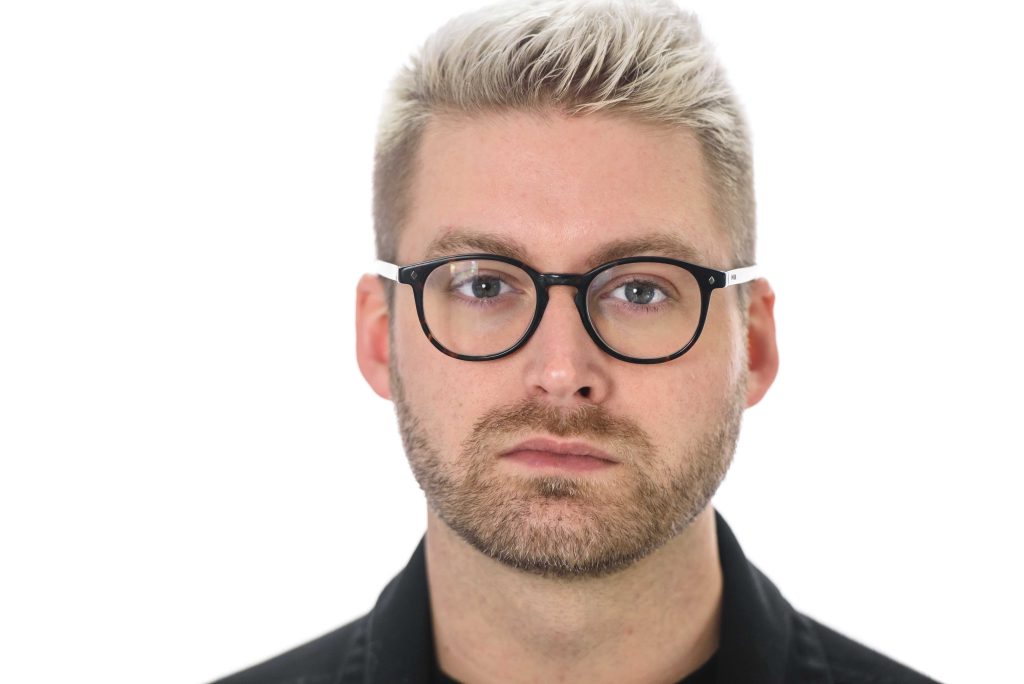
Eyeglasses
What It Means: People who wear glasses are generally seen as more intelligent, and those who wear makeup are seen as more affluent (i.e., “I have expendable money, so I’ll burn it on makeup.”5)
We are naturally attracted to eyes with colors different from our own and thick, long eyelashes… and glasses. Eye adornment makes the person more pleasing. Our affinity for eyeglasses may even date back to the Egyptians5.
Some people even like to place their glasses on top of their head. They may want to be perceived as relaxed, youthful, and cool… because sunglasses on the head give the appearance of 2 huge eyes with dilated pupils, mimicking the non-threatening effect of the large pupils that babies and cuddly toys have.
4 Tips For Your Eyes
Want some more eye-mazing tips? Here are a few more tips to get your brain juices flowing:
Controlling Where People Look
During presentations, you can actually use people’s eyes to lead them in topics. Use your pen to garner attention: hold it at eye-level and then move it up to lift the person’s head when you make a point. You can also compare points by drawing people’s eyes to the right and left with your pen movements.
Become a Baseline Pro
A baseline is how someone acts when they are under normal, non-threatening conditions. You can easily establish baselines by sitting down with the person you want to read better—your child, your spouse, your friend—and talking casually to them about neutral topics that they would have no reason to lie about, such as the weather or what they want to have for dinner. Take note of how they act, how they hold their body, how they sound.
Now that you know the eye cues, you can pay particular attention to when and in which emotional states a person tends to use their eye gestures. Remember, baselining might take more up-front effort, but once you establish a baseline, it may even last forever.
Eye Signs and Chronic Disease
Research shows that an eye exam might be the best way to detect early signs of a few chronic health conditions. Sixty-two percent of high cholesterol cases can be spotted by examining the eyes. Thirty-nine percent of high blood pressure cases and thirty-four percent of diabetes cases can be spotted with signs noted in eye exams.
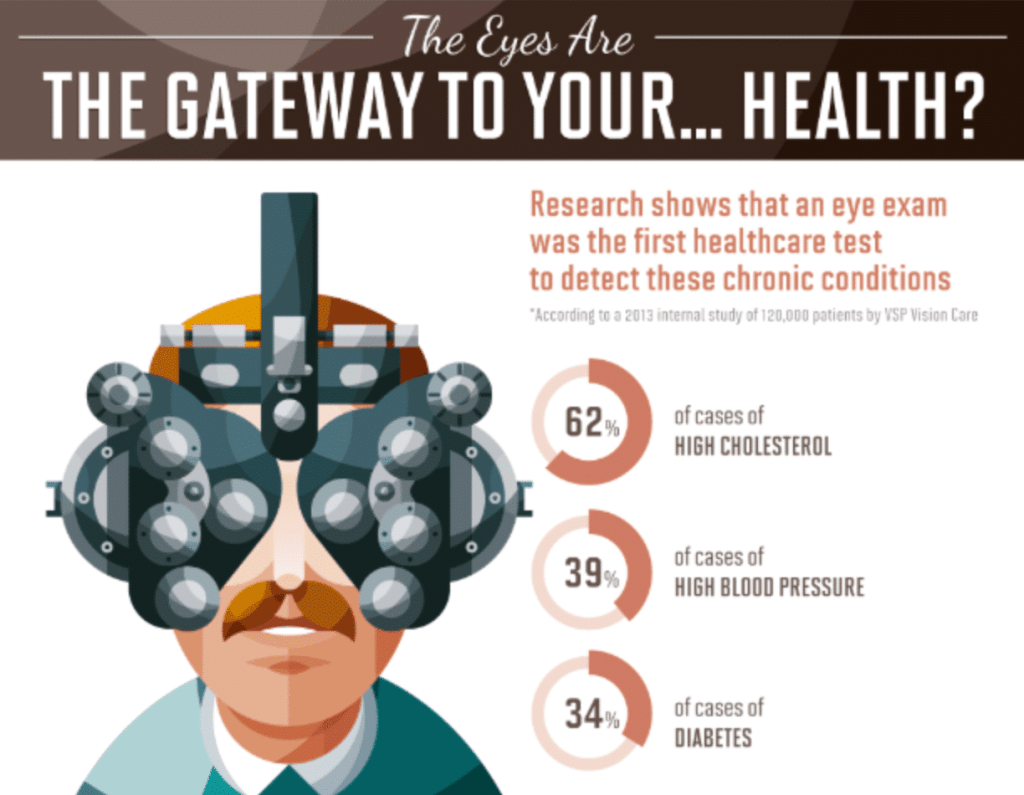
Beware of the Following Eye Cues
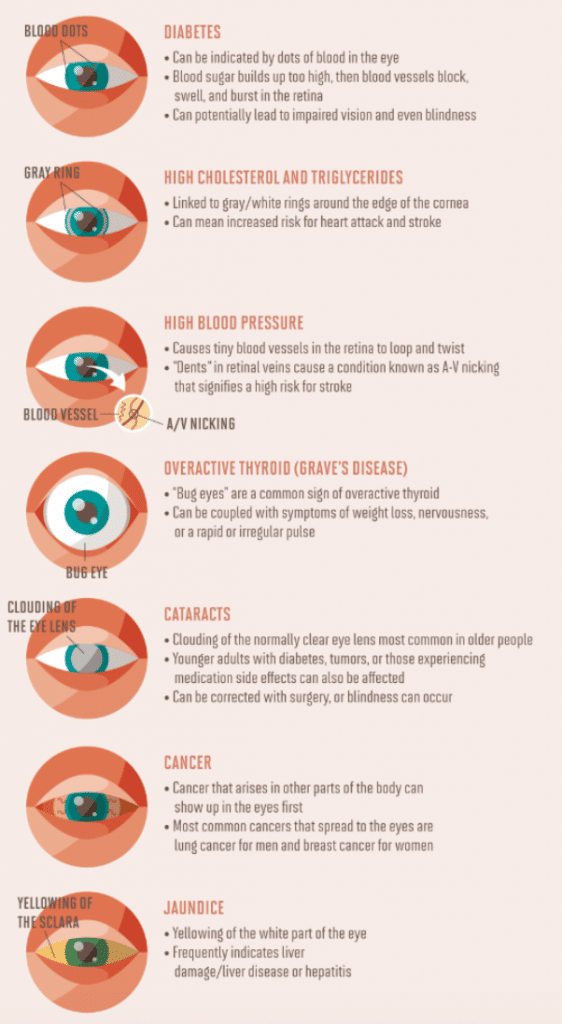
Our eyes are windows into our health. If you spot any of the previous eye cues, be sure to get them checked out.
I hope this post has given you some insight—or some eyesight—into the hidden behavior of the eyes. They are fascinating windows into the soul, the body, and the mind.
Ready to keep learning? Read on…
Sources:
1 Navarro, J. (2018). The dictionary of body language: A field guide to human behavior. New York, NY: William Morrow, an imprint of HarperCollins. 2 Pease, A. (2017). The definitive book of body language: How to read others’ attitudes by their gestures. London: Orion. 3 Navarro, J., & Karlins, M. (2015). What every BODY is saying: An ex-FBI agent’s guide to speed-reading people. New York, NY: Harper Collins. 4 Knapp, M. L., & Hall, J. A. (2014). Nonverbal communication in human interaction. Boston: Wadsworth Cengage Learning. 5 Morris, D. (2012). : The Desmond Morris Guide to Body Language. London: Vintage Digital.Side Note: As much as possible we tried to use academic research or expert opinion for this master body language guide. Occasionally, when we could not find research we include anecdotes that are helpful. As more research comes out on nonverbal behavior we will be sure to add it!











